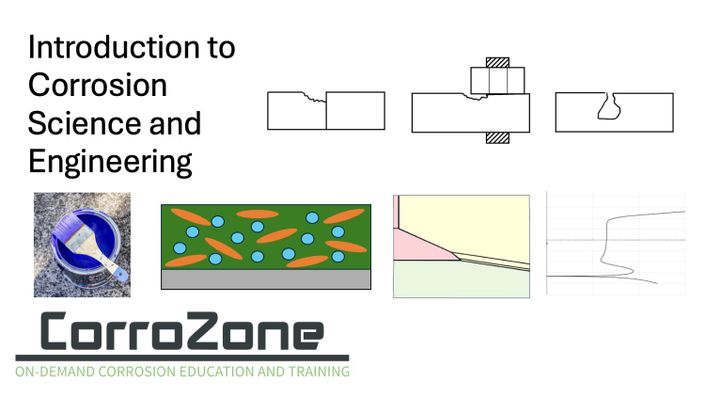This short video outlines the content of the course.
Curriculum
- Introduction to Section 1 (0:50)
- 1.1 Corrosion Classification and Focus of the Course (5:41)
- 1.2 Electrochemical Nature of Corrosion (7:50)
- 1.3 Anodic and Cathodic Reactions (3:43)
- 1.4 Charge Movement in Electrolytes and in Metals (6:41)
- 1.5 Faraday's Law (5:30)
- 1.6 Faraday's Law Calculation Example (4:34)
- Section 1 Quiz
- Introduction to Section 3 (1:29)
- 3.1 Reaction Rates to Electrical Currrents (12:17)
- 3.2 Current – Potential Diagrams and Exchange Current (13:35)
- 3.3 Kinetics Part 1: Activation Controlled Reactions, Butler Volmer and Tafel Law (12:04)
- 3.4 Kinetics Part 2: Cathodic Reaction Under Diffusion Control (16:13)
- 3.5 Kinetics Part 3: Hydrogen Evolution (8:23)
- 3.6 Kinetics Part 4: Passivity (10:55)
- Section 3 Quiz
- Introduction to Section 4 (1:26)
- 4.1 Building Evans Diagrams (8:45)
- 4.2 Stern-Geary Equation - Estimation of Corrosion Current (14:24)
- 4.3 Effect of Kinetics on Corrosion Potential and Current (8:39)
- 4.4 Effect of Oxygen on Corrosion Potential and Current (11:07)
- 4.5 Effects Oxygen and Hydrogen Reactions Overlapping (7:19)
- 4.6 Response of Passive Metals (14:41)
- Section 4 Quiz
- Introduction to Section 5 (1:37)
- 5.1 The Three-Electrode Cell (12:49)
- 5.2 Working With Potentials (9:15)
- 5.3 Electrochemical Measurements: Potentiodynamic Polarization (16:10)
- 5.4 Electrochemical Measurements: Linear Polarization (8:43)
- 5.5 Effects of Electrolyte Resistance (5:16)
- Section 5 Quiz
- Thanks! (0:06)
Course Summary
This corrosion electrochemistry course is designed to provide learners with a comprehensive understanding of the electrochemical aspects of corrosion, covering a wide range of topics across five sections. The content of each section is summarized below:
Section 1: Electrochemical Nature of Aqueous Corrosion
In this section, learners will build a foundation by understanding the fundamental principles and classifications of corrosion. They will grasp the electrochemical nature of aqueous corrosion, including anodic and cathodic reactions, and the movement of charge in metals and electrolytes. Additionally, they will learn to apply Faraday's law to corrosion-related calculations. This section aims to provide a solid conceptual understanding of corrosion as an electrochemical process.
Section 2: Corrosion Thermodynamics
This section delves deeper into the thermodynamics of corrosion. Learners will explore potential differences, standard potentials, and the Nernst equation for equilibrium potentials. They will also gain proficiency in interpreting Pourbaix diagrams to evaluate the thermodynamic feasibility of reactions based on pH and potential. This section provides insights into how thermodynamics govern corrosion behavior, especially concerning different metals and their passivity.
Section 3: Kinetics of Corrosion Reactions
Section 3 focuses on the kinetics of corrosion reactions, elucidating concepts like activation-controlled reactions and diffusion-limited reactions. Learners will understand the factors influencing cathodic reactions, such as oxygen reduction and hydrogen evolution, and the formation of protective oxide films. This section equips students to analyze and compare the corrosion behavior of different metals and recognize the implications of concurrent reactions on the same metal surface.
Section 4: Corrosion Behaviors
Here, learners will explore various aspects of corrosion behaviors, such as Evan's diagrams to analyze multiple reactions, estimating corrosion currents using the Stern-Geary equation, and the effects of cathodically active phases and galvanic corrosion. They will also understand the impact of oxygen on corrosion, including diffusion-limited corrosion. This section focuses on interpreting potentiodynamic polarization curves to assess corrosion mechanisms and analyzing the behavior of passive metals in corrosive environments.
Section 5: Electrochemical Measurements
The final section of the course covers practical aspects of electrochemical measurements. Learners will gain the skills to set up a three-electrode cell, convert potential measurements to the hydrogen reference electrode standard, and distinguish between potential measurements referenced to the open circuit potential and the reference electrode. They will also understand key parameters for potentiodynamic polarization and linear polarization experiments, along with recognizing the impact of electrolyte resistance on potentiodynamic polarization curves.
In summary, this course provides a comprehensive understanding of corrosion electrochemistry from both theoretical and practical perspectives. It equips learners with the knowledge and skills needed to analyze, evaluate, and experimentally measure corrosion processes, making it valuable for students and professionals in fields related to materials science, engineering, and corrosion prevention.
Related Products
Showcase other available courses, bundles, and coaching products you’re selling with the Featured Products block to provide alternatives to visitors who may not be interested in this specific product.

About the Author
Hi,
I am Dr Michele Curioni, I have an MSc in Materials Science and Engineering and a PhD in Corrosion. I have worked on corrosion for over 15 years at the University of Manchester (from 2006 to 2023), where I have gained experience in conducting and leading applied and fundamental research and industrial consultancies on corrosion, electrochemistry and materials science, including surface treatments, organic coatings performance, corrosion measurements and interaction between metallurgical features and corrosion behaviour.
I have also taught in many courses the topics of corrosion, electrochemistry and materials science and took senior roles in the organization and administration of teaching.
I have authored over 150 scientific papers on corrosion and materials science. You can find the list of my publications and my citation record in my google scholar profile .
In 2023 I have funded CorroZone, to promote worldwide accessible teaching, education and training in the field of corrosion science and engineering.
I hope our courses will be valuable for your career, your research or your studies.
Michele Curioni


